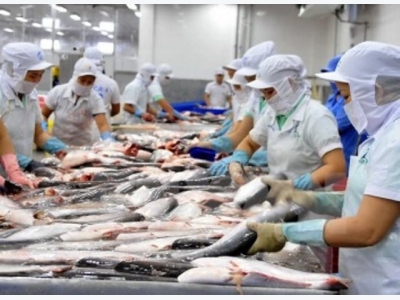Vietnam pangasius exports in 2017 totaled US$1.78 billion

In 2017, Vietnam’s pangasius exports reached US$1.78 billion, up 4.3% over 2016. Of that, exports to the U.S and EU in December 2017 continued to decline by 26% and 24%, respectively and the figure in 2017 decreased by 11% and 22.3% respectively over the same period last year.
Vietnam’s pangasius exports to China - Hong Kong in 2017 hit US$410.8 million, up 34.8% compared to 2016, accounting for 23% of total export value. In the first three quarters of 2017, the export value of pangasius to this market experienced the average growth of two digits. In December 2017, the export value of pangasius to China - Hong Kong increased by nearly 10% over the same period last year.
Exports to the U.S and EU continued to face difficulties. In the European market, out of top 5 importers, exports to the UK went up 2.5% compared to 2016 while those to other markets such as the Netherlands, Germany and Belgium fell by 3.2%; 19.3% and 4.2% respectively over 2016.
In ASEAN, Thailand is the largest buyer of Vietnam’s pangasius exporters with the value of US$51 million, up 8.8%. In addition, shipments to Singapore and the Philippines were worth by 2.8% and 11.9%, respectively. In 2018, Vietnam’s pangasius exports to this region projected to keep the average growth rate as 2017.
In 2017, pangasius exports to the U.S and EU decreased, so the companies increased exports to the 3 potential markets including Brazil, Mexico and Saudi Arabia. The export value to these three markets has grown well and is forecasted to remain at this rate this year. Vietnam’s pangasius sales to Brazil, Mexico and Saudi Arabia reached US$104.7 million, US$104.2 million and US$53.4 million, up 54%; 23.6% and 4.2% respectively over the previous year.
In 2018, Vietnam’s pangasius exports expected to total US$1.85 billion.
Related news
 VASEP asks US to review anti-dumping duty on Vietnamese shrimp
VASEP asks US to review anti-dumping duty on Vietnamese shrimp The US is at present the fourth biggest importer of Vietnamese shrimp. It used to be the biggest several years ago
 Localities urged to gear towards shrimp production targets
Localities urged to gear towards shrimp production targets With large areas of shrimp farms to employ different solutions in order to reach targets set in the national action plan for the development of the shrimp indus
 Vietnam mainly exports whiteleg shrimp to belgium
Vietnam mainly exports whiteleg shrimp to belgium Belgium stayed as the 11th largest shrimp consumer in the world, accounting for about 3% of total shrimp imports worldwide